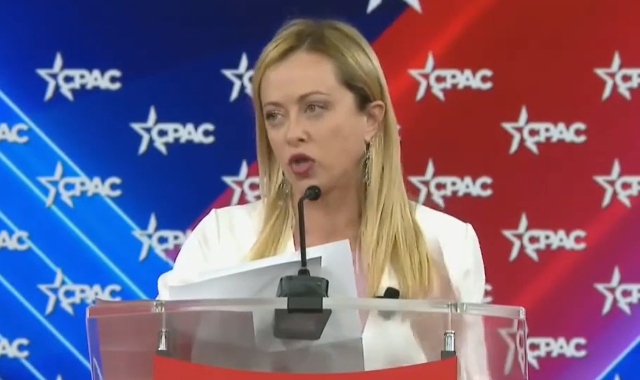- President Trump emphasizes his «fair trade» agenda, using tariffs as leverage in negotiations with Japan, the EU and Mexico, aiming to reduce U.S. trade deficits and rebalance relationships.
- The U.S. has imposed (but temporarily suspended) high tariffs (24% on Japan, 20% on the EU) to pressure trade partners into bilateral deals, threatening key exports like Japanese autos and Italian luxury goods.
- Italian PM Giorgia Meloni navigates tensions between advocating for Italy’s economic interests and maintaining EU unity amid Trump’s disruptive trade policies.
- Trump’s transactional approach risks destabilizing $1.8T in EU-U.S. trade, sparking fears of retaliatory tariffs and a shift away from multilateral cooperation toward protectionism.
- The outcome of ongoing negotiations will test whether Trump’s aggressive tactics yield «fair» deals or deepen trans-Atlantic fractures, with Italy’s stance potentially influencing broader EU strategy.
President Donald Trump underscored a strategic shift in U.S. global trade diplomacy on Thursday, touting “productive” recent talks with Mexico and Japan as he prepares for a White House meeting with Italy’s Prime Minister Giorgia Meloni, a critical juncture in recalibrating trade relationships. The April 17 discussions follow a controversial 90-day pause on retaliatory tariffs targeting Japan and the European Union (EU), part of Trump’s broader campaign to erode longstanding trade imbalances he claims have crippled American industry. At stake are multibillion-dollar trade flows, a fractured trans-Atlantic alliance and Italy’s role as a potential mediator — balancing tariffs and shared security interests. The President’s unorthodox approach, blending high-stakes brinkmanship with campaigning-like negotiation tactics, has reignited debates over the economic impacts of protectionism versus free-market resilience.
Strategic leverage: Tariffs, talks and a global marketplace remade
The week’s developments crystallize Trump’s “fair trade” agenda, which seeks to dismantle what he calls “unilaterally unfair” trade deals. During a Truth Social post, Trump highlighted discussions with Mexico’s president and Japan’s top trade officials, asserting momentum toward mutually beneficial terms. “They were productive — really productive,” he stated, signaling confidence that countries “including China” now seek bilateral agreements.
The centerpiece remains the reciprocal tariffs announced in March, including a 24% levy on Japanese imports and a 20% EU tariff. Though suspended pending negotiations, the move represents an escalation beyond traditional tariff disputes. For Japan, the stakes are profound: the country’s auto and tech sectors — critical to its economy — face threats to exports worth billions. Similarly, Italy’s luxury goods, Parmigiano Reggiano cheese and Prosecco wine — valued at €40 billion ($45.5 billion) annually — hang in the balance.
Trump’s negotiating calculus is clear: Use tariffs as leverage, then pivot to talks. “What we don’t want to do is to be taken advantage of anymore,” he told Breitbart News. “The deals will be fair for everybody.” Administration officials have framed the approach as a response to persistent U.S. trade deficits, which Trump attributes to unilateral concessions in deals like NAFTA.
Meloni’s balancing act: Italy as EU’s unlikely bridge
Meloni’s Thursday meeting with Trump marks a delicate political tightrope walk. As Italy’s first female prime minister and leader of a far-right coalition, she is expected to advocate for her nation’s economic interests while addressing broader EU-U.S. tensions. Yet her ideological alignment with Trump — on issues like immigration curbs and skepticism of multilateralism — contrasts sharply with Italy’s European alliance obligations.
EU envoys emphasized that Meloni’s discussions are not formal trade negotiations, as such authority rests with Brussels. Still, analysts say her willingness to engage individually with Trump could reshape European strategy. “Italy’s surplus with the U.S. is too important to leave unaddressed,” noted Antonio Villafranca of Milan’s ISPI think tank. “But Meloni must also avoid alienating EU partners who see the White House’s tariffs as reckless.”
Meloni’s agenda spans defense spending, Ukraine policy and energy security. While Rome boasts the EU’s largest U.S. trade surplus, its NATO military budget of 1.49% of GDP falls below the 2% target Trump has demanded. The meeting’s symbolism may matter as much as its substance. “Photos with Trump send a message,” said Teneo analyst Wolfango Piccoli. “But behind them, expectations are clear: How much can she secure for Italy without undermining EU unity?”
Broader implications: When economic diplomacy meets geopolitical fractures
The talks occur amid deepening concerns over global trade stability. The EU’s annual exchange with the U.S. exceeds $1.8 trillion, linking manufacturing, agriculture and technology supply chains. U.S. efforts to reset trade terms threaten this interdependence while reinvigorating debates over whether “fairness” requires isolationism or collaboration.
Historically, Trump’s trade policies have prioritized a transactional view over institutional alliances — a reversal from decades of multilateral approaches under prior presidents. His 2017 tariffs on steel and aluminum, along with protracted disputes with China, laid groundwork for today’s confrontations. Yet, critics warn, such tactics risk igniting proactive retaliation from major economies.
Greece’s Prime Minister Kyriakos Mitsotakis, in an interview with Breitbart, expressed optimism that “win-win” deals could materialize, a sentiment Trump echoed: “Deal[s] will be made with every one of them; they’ll be fair deals for everybody.” Behind this rhetoric lies durable skepticism from EU leaders, who fear “fairness” equates to American dominance.
The chess match continues
As Trump’s economic doctrine reshapes global trade dynamics, Italy’s Meloni faces a defining moment — one that could either inflate her reputation as a forceful negotiator or expose the risks of side-stepping Brussels. For the White House, the gamble is equally high: leveraging tariffs and diplomacy to deliver on promises of economic renewal while navigating eroding alliances.
With tariff durations set to expire in staggered increments, the coming months will test whether Trump’s “fair trade” vision translates into written accords — or becomes another chapter in a recurring cycle of punitive measures. For now, Meloni’s ability to secure clarity on Washington’s priorities may decide whether Italy emerges as trade policy’s unlikely broker… or gets caught in the crossfire.
Sources include:
